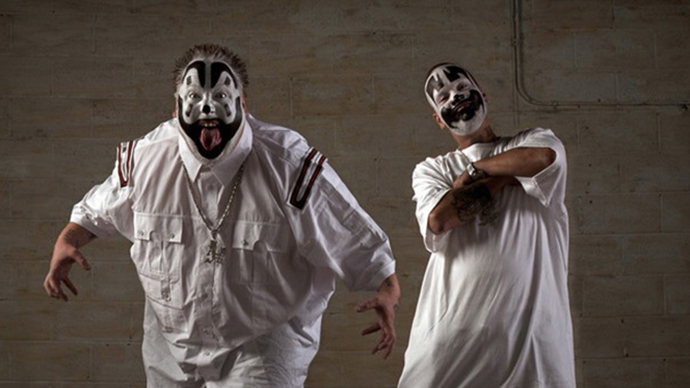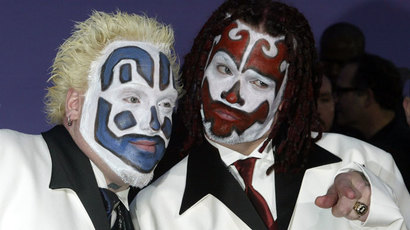Insane Clown Posse takes on FBI and loses: Juggalos classified as gang

A federal judge has dismissed the lawsuit brought by the Insane Clown Posse (ICP), a Detroit rap duo with a large and obsessive fan base, against the US Justice Department and the FBI in retaliation for classifying its fans as members of a criminal gang.
Four fans of the band, which is famous for their flamboyant clown makeup emulated by their followers, known as "Juggalos," from the states of Nevada, California, Iowa and North Carolina joined forces with its two founders, Joseph Bruce and Joseph Utsler, to fight the criminal designation. The Michigan branch of the American Civil Liberties Union (ACLU) also took part in the suit on behalf of ICP.
The case can be traced back to a 2011 report published by the FBI’s National Gang Intelligence Center, which described Juggalos as “a loosely organized hybrid gang” whose members were “expanding into many US communities.”
According to that FBI report, entitled “National Gang Threat Assessment: Emerging Trends,” ICP fans were involved in several incidents which legitimized the threat assessment issued by the agency, including one case where “two suspected Juggalo associates were charged with beating and robbing an elderly homeless man.”
The plaintiffs claimed that the FBI’s designation of Juggalos as a hybrid gang violated their First Amendment rights to free association and expression, as well as their Fifth Amendment right to due process. They also claim that their inclusion in the report was “an arbitrary and capricious state action,” according to court documents.
According to one of the plaintiffs, Mark Parsons of Nevada, Tennessee state troopers detained him for displaying the ICP’s “Hatchetman” logo on his truck, “which depicts a person with wild hair running with a butcher cleaver in his or her hand.”
“Parsons considers himself one of the original fans of ICP, having attended shows and supported the band for years. In honor of the band, Mark named his own trucking company Juggalo Express, LLC and decorated his big rig with the image of a Hatchetman,” the Michigan ACLU said in a statementwhen the suit was filed in January.
“While Mark was hauling cargo in a tractor-trailer emblazoned with an ICP logo, he was detained for a safety inspection by a Tennessee State Trooper. When Mark asked why he was stopped, the Trooper replied it was because the logo was associated with a gang ‘according to the FBI'.”
Another of the suit’s participants, Scott Gandy of North Carolina, said he was forced to spend hundreds of dollars concealing his Juggalo tattoos as a US Army recruit after the military deemed them “gang related” body art.
“Among the supporters of almost any group — whether it be a band, sports team, university, political organization or religion — there will be some people who violate the law,” the suit said.
“However, it is wrong to designate the entire group of supporters as a criminal gang based on the acts of a few. Unfortunately, that is exactly what happened here.”

District Judge Robert Cleland dismissed the lawsuit claiming that ICP and its fans lack standing. In his opinion, Cleland says that the FBI and the Justice Department cannot be held responsible for the actions of local law enforcement.
“For example, Parsons alleges that while he was stopped at a weigh station operated by the Tennessee Department of Transportation, an unidentified Tennessee State Trooper questioned him regarding the ‘hatchetman’ symbol on his truck,” he wrote. “Similarly, [Plaintiff Brandon] Bradley complains of conduct by Citrus Heights and Sacramento, California, police officers who allegedly stopped him on three occasions to ask him questions about his Juggalo tattoos and merchandise.”
“These allegations concern local law enforcement authorities in two different states, each of which made an independent decision to detain and question Plaintiffs. There is no indication that either the FBI or DOJ directed state police to detain and question either subject.”
The two members of ICP and the Michigan ACLU have already filed an appeal.
“This is not the end -- we’ll keep fighting to clear the Juggalo family name,” Bruce (aka Violent J), a member of ICP, said in the ACLU statement. “There has never been—and will never be—a music fan base quite like Juggalos, and while it is easy to fear what one does not understand, discrimination and bigotry against any group of people is just plain wrong and un-American.”
The ACLU is asking the FBI to remove its “arbitrary and erroneous” classification of Juggalos as a hybrid gang, so members “will no longer be unconstitutionally and unjustifiably singled out as targets for scrutiny and harassment by law enforcement authorities throughout the country.”
“There is no doubt that the FBI created this problem and the solution begins there as well,” said Michael J. Steinberg, ACLU of Michigan legal director. “Otherwise, we’ll be playing whack-o-mole to stop local law enforcement agencies from discriminating against our clients, when the agencies are just following the FBI’s lead.”














